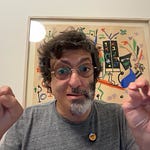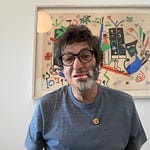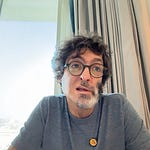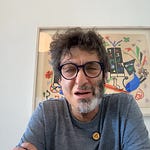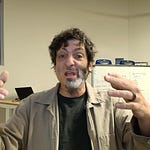So, I was asked if there's anything about my life that has improved because of my injury. First of all, let me be clear: injuries are terrible. They bring pain, helplessness, ongoing suffering, and fear. My time in the hospital was dreadful, and I wouldn't wish even a fraction of that on anyone. But the question isn't whether I recommend enduring severe injuries—I absolutely do not. The question is whether there's any silver lining amidst all the pain and challenges. I believe there are a few positives, and I'd like to describe some of them.
First, there are things I now understand more deeply. Everyone experiences pain to some degree, but enduring such intense pain has given me a unique perspective on it. It helps me empathize with those trying to escape their own misery. So, I think about pain, helplessness, and self-acceptance as magnifying glasses. We all go through these experiences, but when they reach a certain intensity, they provide a deeper understanding and empathy that permeates our personality.
Another significant change is the distance from life it gave me. While my friends were out living their young lives—being romantic, starting careers—I was confined to a bed. Even after rejoining society, my strange hand made social interactions awkward. This separation offered a unique vantage point as a social scientist. When you're in the thick of things, they make sense; stepping back allows you to question why we do what we do.
My empathy has also evolved. I have more empathy for people with serious injuries but slightly less for minor ones. For instance, someone close to me once had a small cut, and while it was painful for them, it seemed minor to me compared to what I've endured. This might be because our brains use mirror neurons to simulate others' pain based on our own experiences. Given my history with severe pain, my brain likely reacts more intensely to others' significant suffering.
I've also developed increased resilience. Having faced extreme challenges and managed them gives me confidence that I can handle future difficulties—physical or mental. For example, my late professor Hanan Frank and I chose not to use Novocaine at the dentist because we felt capable of handling the pain.
I'm no longer afraid to die. Life is a blessing, but I'm not scared of its end—though I'd prefer not to die in a hospital due to my unpleasant memories there.
I have an ongoing awareness that life is a gift. My injury is visible daily; seeing myself in the mirror or trying to move my hand constantly reminds me of life's magic. This visible reminder encourages me to take more risks and be more curious and playful because why not? The downside doesn't seem as daunting anymore.
Finally—and this is especially beneficial as a professor—I don't judge myself by others' standards anymore. Society often measures us against specific benchmarks in our professions or roles in life. Since there are many things I can't do due to my injury, I've created my own standards instead of holding myself accountable to others. This approach can upset some people who feel bound by conventional standards, but I've learned not to concern myself with their opinions.
From this long list of changes, the most meaningful ones are having my own standards and increased resilience.
Many people with injuries call me seeking advice about their own situations rather than mine. When life becomes unbearable due to injury, what they've lost is clear; what they'll gain remains a mystery that takes time to uncover. If you'd asked me what I'd gain when I first got injured, I couldn't have told you—but now I can share this perspective with others.
I advise them first to say goodbye to their old selves quickly because dwelling on what they can't do anymore isn't helpful. Then I encourage them to explore new paths where they can excel and remind them of two key lessons: they've proven their ability to overcome tremendous challenges and should remember their resilience; they'll never be standard people again—so they must find their unique path.
I wish someone had given me this advice back then—but since no one did—it's what I try to offer others now.
Thanks for listening! If more insights come to mind about how my injury has positively impacted my life—I’ll add them later.





